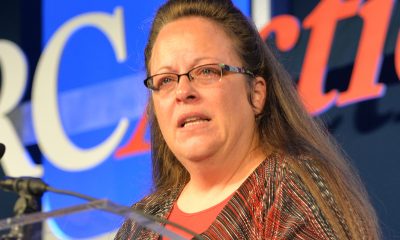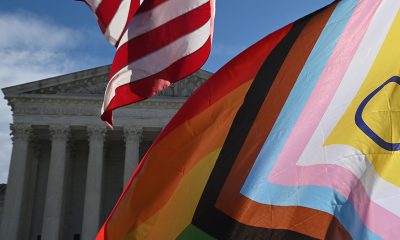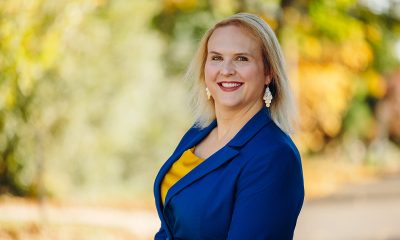News
Meet the 8 House Dems who don’t co-sponsor ENDA
Advocates push to find 218 votes for bill
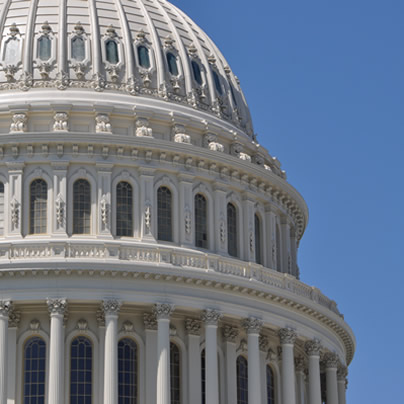
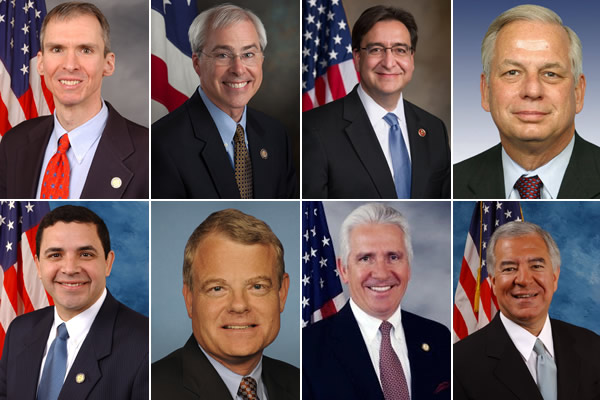
Clockwise from top left, Rep. Dan Lipinski (D-Ill.), Rep. John Barrow (D-Ga.), Rep. Pete Gallego (D-Texas), Rep. Gene Green (D-Texas), Rep. Nick Rahall (D-W.Va.), Rep. Jim Costa (D-Calif.), Rep. Mike McIntyre (D-N.C.) and Rep. Henry Cuellar (D-Texas) (Photos public domain)
Amid the push to pass the Employment Non-Discrimination Act, much has been said about the daunting task of advancing the bill against Republican opposition — including from U.S. House Speaker John Boehner (R-Ohio) himself — in the GOP-controlled chamber of Congress.
But the Democratic caucus isn’t unanimous in its sponsorship of the legislation despite a push from the White House and Democratic leaders to advance ENDA. A total of eight Democrats have so far declined to co-sponsor the bill, although at least two said they would vote for it and one has said he’s inclined to vote for it if it comes to the House floor.
The eight Democrats who don’t co-sponsor ENDA are Reps. Dan Lipinksi (Ill.), Jim Costa (Calif.), John Barrow (Ga.), Mike McIntyre (N.C.), Pete Gallego (Texas), Henry Cuellar (Texas), Gene Green (Texas) and Nick Rahall (W.Va.).
Of these eight Democrats, most are from Texas, the largest state without any laws providing non-discrimination protections on the basis of sexual orientation or gender identity.
Chuck Smith, executive director of Equality Texas, said the three Texans who don’t co-sponsor ENDA — Gallego, Cuellar and Green — likely have “a misplaced fear” about opposition to non-discrimination in their districts.
“When Texans go to work each day, they want to be judged on their professionalism, their experience, their performance, and their ability to get the job done,” Smith said. “With hard work, fulfilling their responsibilities, and playing by the rules, they are striving for a fair chance at achieving a piece of the American Dream. And in Texas, fully three-fourths of voters support prohibiting employment discrimination.”
But two of these lawmakers, Gallego and Green, have signaled they would support ENDA if it comes up for a vote on the House floor, even though they have yet to co-sponsor the legislation.
Jose Borjon, a Gallego spokesperson, said his boss “from the beginning” has said “he will vote for ENDA” on the House floor.
“Congressman Gallego’s family has a long history of protecting civil rights and opposing discrimination,” Borjon said. “Like his parents before him, Congressman Gallego is also opposed to any form of discrimination, including discrimination against individuals based on race, color, ethnicity, sexual orientation, gender identity, sex, religion, age, disability or personal beliefs.”
Borjon didn’t respond to a follow-up email asking why Gallego won’t co-sponsor ENDA if the lawmaker would vote for the bill.
Green’s office didn’t respond to a request for comment. But according to Hair Balls, a Houston-based political blog, he’ll vote for the legislation if it comes to the House floor.
“I am opposed to discrimination in the workplace, whether based on gender, race, religion, or sexual orientation, and will vote in support of the Employment Non-Discrimination Act when it comes to the House floor for a vote,” Green is quoted as saying.
Cuellar has made no such commitment to voting for ENDA. His office didn’t respond to the Blade’s request seeking comment on the bill.
According to LoneStar Q’s John Wright, Dallas activist Jeff Strater expressed disappointment about a meeting during a Capitol Hill lobby day when he and others sought to discuss ENDA with Cuellar staff and a proposed letter seeking an executive order barring LGBT workplace discrimination.
“We had an appointment with Henry Cuellar’s office last Thursday in D.C. to talk about the letter, ENDA and other LGBT legislation,” Strater was quoted as saying. “They refused to meet with us in the office for our appointment (unlike other members of Congress) and we met in a busy hallway. The meeting was also with a legislative fellow and not a legislative aide. This was worse than our meeting with Ted Cruz’s staff. The sad part is that in our small group we had people with long ties to Cuellar’s congressional district and Laredo.”
Another Democrat in another state has also signaled he’ll likely support ENDA, even though he hasn’t yet signed on a co-sponsor to the bill.
Jessica Kahanek, a Costa spokesperson, said the lawmaker is still reviewing the legislation, but is “inclined” to vote for the bill should it come to the House floor.
“Rep. Costa is still reviewing the bill and its implications for small business owners before he makes a final decision on co-sponsoring,” Kahanek said. “He is inclined to support ENDA should there be a vote held on the bill.”
Costa supports marriage equality and co-sponsors the Student Non-Discrimination Act, which would bar schools from allowing discrimination or harassment of LGBT students.
One notable House Democrat who doesn’t co-sponsor ENDA is Lipinski, who withholds support for ENDA even though he voted for “Don’t Ask, Don’t Tell” repeal and LGBT-inclusive hate crimes legislation. However, Lipinski opposes same-sex marriage.
Bernard Cherkasov, CEO of Equality Illinois, called on Lipinski to support ENDA as he touted his organization’s work in “building stronger and stronger support” for the legislation among his state’s delegation to Congress.
“Congressman Lipinski represents a district where many employers, community leaders, and clergy members are very vocal about their support for ENDA; and LGBT workplace protections have been the law in Illinois for almost a decade,” Cherkasov said. “In a state with broad bipartisan support for ENDA, we hope that Congressman Lipinski will carry those values to Washington and sponsor ENDA.”
Not helping in the case of Lipinski — as well as Costa and Cuellar — is the fact that they’re Catholic and the U.S. Conference of Catholic Bishops has come out in opposition to ENDA when it came up for a vote in the Senate, saying it threatens religious liberty, would enable legalization of same-sex marriage and rejects the biological basis of gender.
Other House Democrats who don’t co-sponsor ENDA have a history of assuming anti-LGBT positions as members of Congress. Most notable among them are Rep. Nick Rahall (D-W.Va.) and retiring Rep. Mike McIntyre (D-N.C.), the only Democrats who currently co-sponsor a U.S. constitutional amendment that would ban same-sex marriage in the country. Their offices didn’t respond to a request for comment on their position on ENDA.
Another longtime House Democrat who doesn’t co-sponsor ENDA and who was a one-time supporter of a Federal Marriage Amendment is Barrow. Despite voting “yes” on this amendment, Barrow has taken pro-LGBT positions, such as voting in favor of “Don’t Ask, Don’t Tell” repeal. His office didn’t respond to a request for comment on ENDA.
Jeff Graham, executive director of Georgia Equality, said Barrow has assumed more anti-LGBT positions after redistricting, when Barrow’s district was drawn to become more conservative.
“The politics behind this, not that it excuses it, but for the last several times that he has run for office, he has been redistricted into a district that is majority Republican,” Graham said. “And so, he actually has a voting record on LGBT issues, as well as a lot of other issues that are important to many of us, where he did not support them or voted against them. His lack of sponsorship of ENDA is not actually a surprise; it’s a disappointment, but it is not a surprise.”
Graham said getting Barrow to support ENDA would require “an immense grassroots” effort among his constituents, but his organization is prepared to support the Human Rights Campaign in planned field operations to encourage him to back the bill.
Other groups behind ENDA have launched initiatives at the national level aimed at building support for the legislation as the push to pass it continues. The Senate last year passed ENDA on bipartisan vote of 64-32, so House passage is the only remaining step necessary for approval before it would go to President Obama’s desk.
Tico Almeida, president of Freedom to Work, said boosting the number of ENDA co-sponsors on both sides of the aisle is important “to clearly demonstrate” majority support exists for LGBT workplace protections in the House.
“We think that if a House vote were held today, ENDA would pass with more than 218 votes, but winning over the next batch of co-sponsors would help us prove that definitively to House leadership,” Almeida said. “Reaching 218 supporters would increase pressure on those who have been blocking an up-or-down vote.”
Almeida drew a distinction between co-sponsoring ENDA and merely articulating support, saying pledging a “yes” vote without co-sponsoring the bill is the “second-best option” for lawmakers.
A House Democratic leadership aide, who spoke on condition of anonymity, said the only way to push these lawmakers to support ENDA is for constituents within their districts to ask their members to get behind the bill. The aide said House Minority Leader Nancy Pelosi (D-Calif.) personally whipped members to support ENDA, which is why all but eight Democratic members co-sponsor the bill this Congress.
The White House has continually called for passage of ENDA. The White House didn’t respond to a request for comment on whether it has reached out to these eight House Democrats to encourage them to support the legislation.
At a time when DNC is raising money on behalf of Democrats in the 2014 election, the DNC didn’t respond to the Blade’s request for comment on whether House Democrats who don’t co-sponsor ENDA are out of line with principles of the Democratic Party, even though the 2012 Democratic Party platform endorses the bill on the basis that “people should not be fired based on their sexual orientation or gender identity.”
Although eight House Democrats aren’t co-sponsors of ENDA, a sea of Republicans continue to withhold support of the bill in a chamber of Congress where their party holds the majority. Of the 233 Republicans in the U.S. House, only six co-sponsor ENDA: Reps. Ileana Ros-Lehtinen (R-Fla.), Richard Hanna (R-N.Y.), Charles Dent (R-Pa.), Jon Runyan (R-N.J.), Chris Gibson (R-N.Y.) and Michael Grimm (R-N.Y.).
Americans for Workplace Opportunity, a coalition of groups seeking to pass ENDA, have launched a $2 million push aimed at passing ENDA in the House. Much of the money is coming from Republican superdonors Paul Singer and Seth Klarman, who each donated $375,000. Nonetheless, not a single Republican co-sponsor has signed on to ENDA since the start of the campaign last month.
Jeff Cook-McCormac, senior adviser to the pro-LGBT American Unity Fund, nonetheless predicted more Republican co-sponsors of ENDA in the coming days.
“In an authentically bipartisan way, we remain laser-focused on getting to the critical number of 218, demonstrating majority support in the chamber,” Cook-McCormac said. “This much-needed engagement, member-by-member, in thoughtful and respectful conversations about the need for ENDA is what will enable support for the bill to grow, as we’ve seen it is a critical element of every successful effort that has advanced freedom for LGBT Americans in our country. I expect you will see other Republicans indicate their support for ENDA in the weeks and months to come.”
Virginia
Ghazala Hashmi names Equality Virginia executive director to transition team
Narissa Rahaman will join Adam Ebbin, Mark Sickles on LG-elect’s committee.
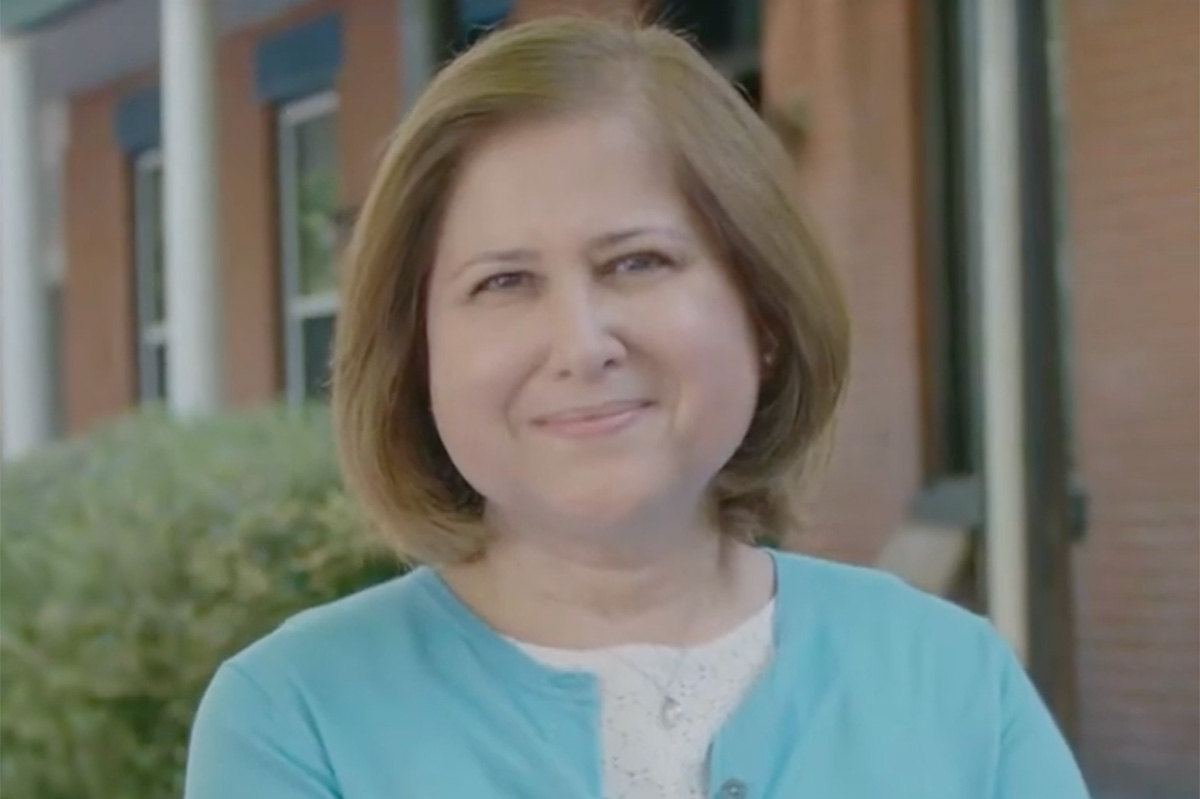
Virginia Lt. Gov.-elect Ghazala Hashmi has named Equality Virginia Executive Director Narissa Rahaman to her transition team.
State Sen. Adam Ebbin (D-Alexandria) and state Del. Mark Sickles (D-Fairfax County) are among those who Hashmi also named to her Transition Committee.
“I am honored to have this diverse group of leaders join our transition,” said Hashmi in a statement. “Their experience, perspective, and commitment to public service will help build an Office of the Lieutenant Governor that is responsive, innovative, and relentlessly focused on improving the lives of every Virginia resident.”
“Together, we will develop a thoughtful roadmap for the work ahead — one that ensures we are engaging communities, strengthening partnerships across the state, and preparing this office to serve with purpose and conviction from Day One,” she added. “I am grateful to each member for bringing time, expertise, and passion to this effort.”
Hashmi, a Democrat, defeated Republican John Reid, who is openly gay, on Nov. 4.
Hashmi will succeed outgoing Lt. Gov. Winsome Earle-Sears on Jan. 17.
U.S. Military/Pentagon
Serving America, facing expulsion: Fight for trans inclusion continues on Veterans Day
Advocates sue to reverse Trump ban while service members cope with new struggles

President Trump signed EO 14183, titled “Prioritizing Military Excellence and Readiness,” on Jan. 27, directing the Department of Defense (DoD) to adopt policies that would prohibit transgender, nonbinary, and gender-nonconforming people from serving in the military.
The Trump-Vance administration’s policy shift redefines the qualifications for military service, asserting that transgender people are inherently incapable of meeting the military’s “high standards of readiness, lethality, cohesion, honesty, humility, uniformity, and integrity,” citing a history or signs of gender dysphoria. According to the DoD, this creates “medical, surgical, and mental health constraints on [an] individual.” Regardless of their physical or intellectual capabilities, transgender applicants are now considered less qualified than their cisgender peers.
On Jan. 28, 2025, GLBTQ Legal Advocates and Defenders (GLAD) Law and the National Center for LGBTQ Rights (NCLR) filed Talbott v. Trump, a federal lawsuit in the U.S. District Court for the District of Columbia challenging the executive order. Originally filed on equal protection grounds on behalf of six active service members and two individuals seeking enlistment, the case has since grown to include 12 additional plaintiffs.
The Washington Blade spoke exclusively with Second Lt. Nicolas (Nic) Talbott, U.S. Army, a plaintiff in the case, and with Jennifer Levi, Senior Director of Transgender and Queer Rights at GLAD Law, who is leading the litigation.
For Talbott, serving in the military has been a lifelong aspiration, one he pursued despite the barriers posed by discriminatory policies.
“Being transgender posed quite the obstacle to me achieving that dream,” Talbott told the Blade. “Not because it [being trans] had any bearing on my ability to become a soldier and meet the requirements of a United States soldier, but simply because of the policy changes that we’ve been facing as transgender service members throughout the course of the past decade… My being transgender had nothing to do with anything that I was doing as a soldier.”
This drive was fueled by early life experiences, including the impact of the Sept. 11 terrorist attacks, which shaped his desire to protect his country.
“Even for an eight-year-old kid, [9/11] has a tremendous amount of impact… I remember thinking, you know, this is a terrible thing. Me, and when I grow up, I want to make sure nothing like this ever happens again,” he said. “I’ve still tried to gear my life in a way that I can be preparing myself to eventually help accomplish that mission of keeping America safe from anything like that ever happening again.”
The attacks inspired countless Americans to enlist; according to the New York City government, 181,510 joined active duty and 72,908 enlisted in the reserves in the year following 9/11. Although Talbott was too young to serve at the time, the events deeply influenced his educational and career path.
“For me, [9/11] just kind of helped shape my future and set me on the path that I’m currently on today,” he added. “It ignited my passion for the field, and it’s something that you know, I’ve carried with me into my adult life, into my professional life, and that I hope to have a career in the future.”
Talbott holds a master’s degree in criminology with a focus on counterterrorism and global security, and while completing his degree, he gained practical experience working with the Transportation Security Administration.
Despite the public scrutiny surrounding the lawsuit and the ongoing uncertainty of his military future, Talbott remains grounded in the values that define military service.
“Being so public about my involvement with this lawsuit grants me the very unique opportunity to continue to exemplify those values,” Talbott said. “I’m in a very privileged spot where I can speak relatively openly about this experience and what I’m doing. It’s very empowering to be able to stand up, not only for myself, but for the other transgender service members out there who have done nothing but serve with honor and dignity and bravery.”
The ban has created significant uncertainty for transgender service members, who now face the possibility of separation solely because of their gender identity.
“With this ban… we are all [trans military members] on track to be separated from the military. So it’s such a great deal of uncertainty… I’m stuck waiting, not knowing what tomorrow might bring. I could receive a phone call any day stating that the separation process has been initiated.”
While the Department of Defense specifies that most service members will receive an honorable discharge, the policy allows for a lower characterization if a review deems it warranted. Compensation and benefits differ depending on whether service members opt for voluntary or involuntary separation. Voluntary separation comes with full separation pay and no obligation to repay bonuses, while involuntary separation carries lower pay, potential repayment of bonuses, and uncertain success in discharge review processes.
Healthcare coverage through TRICARE continues for 180 days post-discharge, but reduced benefits, including VA eligibility, remain a concern. Those with 18–20 years of service may qualify for early retirement, though even this is not guaranteed under the policy.
Talbott emphasized the personal and professional toll of the ban, reflecting on the fairness and capability of transgender service members.
“Quite frankly, the evidence that we have at hand points in the complete opposite direction… there are no documented cases that I’m aware of of a transgender person having a negative impact on unit cohesion simply by being transgender… Being transgender is just another one of those walks of life.”
“When we’re losing thousands of those qualified, experienced individuals… those are seats that are not just going to be able to be filled by anybody … military training that’s not going to be able to be replaced for years and years to come.”
Talbott also highlighted the unique discipline, dedication, and value of diversity that transgender service members bring—especially in identifying problems and finding solutions, regardless of what others think or say. That, he explained, was part of his journey of self-discovery and a key reason he wants to continue serving despite harsh words of disapproval from the men leading the executive branch.
“Being transgender is not some sad thing that people go through… This is something that has taken years and years and years of dedication and discipline and research and ups and downs to get to the point where I am today… my ability to transition was essential to getting me to that point where I am today.”
He sees that as an asset rather than a liability. By having a more diverse, well-rounded group of people, the military can view challenges from perspectives that would otherwise be overlooked. That ability to look at things in a fresh way, he explained, can transform a good service member into a great one.
“I think the more diverse our military is, the stronger our military is… We need people from all different experiences and all different perspectives, because somebody is going to see that challenge or that problem in a way that I would never even think of… and that is what we need more of in the U.S. military.”
Beyond operational effectiveness, Talbott emphasized the social impact of visibility and leadership within the ranks. Fellow soldiers often approached him for guidance, seeing him as a trusted resource because of his transgender status.
“I can think of several instances in which I have been approached by fellow soldiers… I feel like you are a person I can come to if I have a problem with X, Y or Z… some people take my transgender status and designate me as a safe person, so to speak.”
With the arrival of Veterans Day, the Blade asked what he wishes the public knew about the sacrifices of transgender service members. His answer was modest.
“Every person who puts on the uniform is expected to make a tremendous amount of sacrifice,” Talbott said. “Who I am under this uniform should have no bearing on that… We shouldn’t be picking and choosing which veterans are worthy of our thanks on that day.”
Jennifer Levi, GLAD Law’s Senior Director of Transgender and Queer Rights, also spoke with the Blade and outlined the legal and human consequences of the ban. This is not Levi’s first time challenging the executive branch on transgender rights; she led the legal fight against the first Trump administration’s military ban in both Doe v. Trump and Stockman v. Trump.
Levi characterized the policy as overtly cruel and legally indefensible.
“This policy and its rollout is even more cruel than the first in a number of ways,” Levi explained. “For one, the policy itself says that transgender people are dishonest, untrustworthy and undisciplined, which is deeply offensive and degrading and demeaning.”
She highlighted procedural abuses and punitive measures embedded in the policy compared to the 2017 ban.
“In the first round the military allowed transgender people to continue to serve… In this round the military policy purge seeks to purge every transgender person from military service, and it also proposes to do it in a very cruel and brutal way, which is to put people through a process… traditionally reserved for kicking people out of the military who engaged in misconduct.”
Levi cited multiple examples of discrimination, including the revocation of authorized retirements and administrative barriers to hearings.
She also explained that the administration’s cost argument is flawed, as removing and replacing transgender service members is more expensive than retaining them.
“There’s no legitimate justification relating to cost… it is far more expensive to both purge the military of people who are serving and also to replace people… than to provide the minuscule amount of costs for medications other service members routinely get.”
On legal grounds, Levi noted the ban violates the Equal Protection Clause.
“The Equal Protection Clause prevents laws that are intended to harm a group of people… The doctrine is rooted in animus, which means a bare desire to harm a group is not even a legitimate governmental justification.”
When asked what she wishes people knew about Talbott and other targeted transgender military members, Levi emphasized their extraordinary service.
“The plaintiffs that I represent are extraordinary… They have 260 years of committed service to this country… I have confidence that ultimately, this baseless ban should not be able to legally survive.”
Other organizations have weighed in on Talbott v. Trump and similar lawsuits targeting transgender service members.
Human Rights Campaign Foundation President Kelley Robinson criticized the ban’s impact on military readiness and highlighted the counterintuitive nature of removing some of the country’s most qualified service members.
“Transgender servicemembers serve their country valiantly, with the same commitment, the same adherence to military standards and the same love of country as any of their counterparts,” Robinson said. “This ban by the Trump administration, which has already stripped transgender servicemembers of their jobs, is cruel, unpatriotic, and compromises the unity and quality of our armed forces.”
Lambda Legal Senior Counsel Sasha Buchert echoed the legal and moral imperative to reverse the policy.
“Every day this discriminatory ban remains in effect, qualified patriots face the threat of being kicked out of the military,” she said. “The evidence is overwhelming that this policy is driven by animus rather than military necessity… We are confident the court will see through this discriminatory ban and restore the injunction that should never have been lifted.”
The White House
Trump targets LGBTQ workers in new loan forgiveness restrictions
A new Trump policy attempts to limit loan forgiveness for federal workers working with LGBTQ issues.

The Trump-Vance administration is moving forward with plans to restrict federal workers from using the Public Service Loan Forgiveness (PSLF) program if their work involves issues related to LGBTQ individuals, immigrants, or transgender children.
Lawsuits were filed last week in more than 20 cities — including Albuquerque, N.M., Boston, Chicago, and San Francisco — challenging the administration’s efforts to withhold loan forgiveness from organizations that oppose the president and his party’s political agenda.
Created by Congress in 2007 and signed into law by then-President George W. Bush, PSLF cancels the federal student loan debts of borrowers who spend a decade or more working in public service. The program covers teachers, nurses, law enforcement officers (including members of the military), and employees of tax-exempt organizations under Section 501(c)(3). Many of those who work to support LGBTQ rights are employed by such organizations — meaning they stand to lose eligibility under the new policy.
As of 2024, more than 1 million Americans have benefited from PSLF, helping erase an estimated $74 billion in student loan debt, according to a Biden-era estimate.
Under the new rule, which takes effect July 1, 2026, the Department of Education will be able to deny loan forgiveness to workers whose government or nonprofit employers engage in activities deemed to have a “substantial illegal purpose.” The power to define that term will rest not with the courts, but with the education secretary.
The rule grants the secretary authority to exclude groups from the program if they participate in activities such as trafficking, illegal immigration, or what it calls the “chemical castration” of children — defined as the use of hormone therapy or puberty-blocking drugs, a form of gender-affirming care sometimes provided to transgender children and teens.
Under Secretary of Education Nicholas Kent defended the change, arguing that the new rule would better serve the American people, despite every major American physician organization research showing gender-affirming care helps more than it harms.
“It is unconscionable that the plaintiffs are standing up for criminal activity,” Kent said in a statement to NPR. “This is a commonsense reform that will stop taxpayer dollars from subsidizing organizations involved in terrorism, child trafficking, and transgender procedures that are doing irreversible harm to children.”
The Williams Institute, a leading research center on sexual orientation and gender identity law and public policy, warned that this — along with other restrictions on federal loan forgiveness — would disproportionately harm LGBTQ Americans. The institute found that more than one-third (35%) of LGBTQ adults aged 18 to 40 — an estimated 2.9 million people — hold over $93.2 billion in federal student loans. About half (51%) of transgender adults, 36% of cisgender LBQ women, and 28% of cisgender GBQ men have federal student loans.
“The proposed restrictions on student loans will particularly affect the nearly one-quarter of LGBTQ adults employed in the public or nonprofit sectors, which qualify for the Public Student Loan Forgiveness program,” said Brad Sears, Distinguished Senior Scholar of Law and Policy at the Williams Institute, who authored a brief on how the proposed changes could impact LGBTQ borrowers. “A recent executive order could potentially disqualify anyone working for an organization involved in gender-affirming care, or possibly those serving transgender individuals more broadly, from the PSLF program.”
-

 U.S. Supreme Court2 days ago
U.S. Supreme Court2 days agoSupreme Court rejects Kim Davis’s effort to overturn landmark marriage ruling
-

 U.S. Supreme Court4 days ago
U.S. Supreme Court4 days agoLGBTQ legal leaders to Supreme Court: ‘honor your precedent, protect our families’
-

 Pennsylvania4 days ago
Pennsylvania4 days agoErica Deuso elected as Pa.’s first openly transgender mayor
-

 Out & About5 days ago
Out & About5 days agoGala Hispanic Theatre’s Flamenco Festival returns





